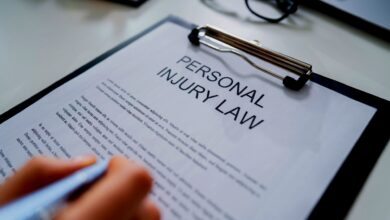Understanding Criminal Appeals, PI Cases with Your Attorney

In the intricate realm of legal proceedings, understanding the nuances of both Criminal Appeals and Personal Injury (PI) Cases is crucial for those seeking justice. This comprehensive guide aims to shed light on the processes involved in these two distinct yet occasionally overlapping areas of law. Whether grappling with a criminal conviction or navigating a personal injury claim, this article will provide insights into the appeals process and guide you in working effectively with your attorney.
Read More: What Steps Should You Take After Arrest Consult a Criminal Defense Attorney
What a Criminal Appeal Entails
When an individual faces a criminal conviction, they believe it to be unjust, and the avenue of appeal becomes a vital recourse. Criminal appeals primarily involve challenging a court’s decision based on legal errors or procedural irregularities. Understanding the grounds for appeals is paramount, encompassing issues such as:
- Legal Errors – Mistakes made during the trial may have affected the verdict.
- Procedural Irregularities – Violations of due process or legal procedures during the trial.
Importance of Timeliness in Filing Appeals
The significance of acting promptly in the intricate process of filing appeals cannot be overstated. Time is indeed of the essence, particularly in criminal appeals where strict deadlines dictate the initiation of the appellate process. Failing to adhere to these timelines can have severe consequences, potentially leading to the forfeiture of the right to appeal.
Understanding Appellate Deadlines
Appellate deadlines are often enshrined in statutes and court rules, varying based on jurisdiction and the nature of the case. Adhering to these deadlines is crucial for preserving the right to appeal and ensuring that legal options remain available.
Preserving Evidence and Witness Testimonies
As time elapses, memories can fade, making it challenging to retrieve accurate details crucial for building a compelling appeal. Timely filing allows for preserving and cataloging crucial documentary evidence, ensuring its admissibility in appellate proceedings.
Preventing Procedural Barriers
Failing to file within the prescribed timeframe may result in procedural default, limiting the grounds on which an appeal can be based. A delay in filing can preclude the consideration of otherwise meritorious claims, affecting the overall strength of the appeal.
Exhaustion of Remedies
In some cases, there may be sequential legal steps or remedies that must be exhausted before filing an appeal. Timely action ensures compliance with these prerequisites. Initiating the appeal process promptly helps avoid additional procedural hurdles that may arise if there are delays in exhausting remedies.
Collaboration with Legal Counsel
Timely engagement with legal counsel allows for thorough preparation, including case review, legal research, and strategy development. An experienced criminal attorney can provide crucial advice on jurisdiction-specific deadlines and ensure all necessary documents are filed within the stipulated timeframes.
Understanding the Nature of PI Appeals
Personal Injury (PI) appeals represent a legal recourse for individuals seeking redress following accidents or incidents of negligence. In this section, we delve into the intricacies of PI appeals, providing clarity on:
Common Grounds for PI Appeals
Appeals may arise from disagreements over the assignment of liability. This could involve proving the negligence of another party or contesting allegations of contributory negligence. Individuals might pursue appeals when they believe the awarded damages are inadequate to cover medical expenses, lost wages, and other incurred costs. Legal or procedural mistakes during the initial trial can also be grounds for a PI appeal.
Appellate Courts and PI Cases
Like criminal appeals, PI cases progress through a hierarchy of appellate courts. Understanding these courts’ structure, jurisdiction, and function is imperative for those contemplating an appeal. Insight into the specific procedures governing PI appeals within appellate courts, including filing requirements, timelines, and presentation of arguments.

Role of Evidence in PI Appeals
In the intricate landscape of Personal Injury (PI), the presentation and interpretation of evidence play a pivotal role in shaping the outcome, as presented in this article. This section comprehensively explores the multifaceted dimensions of evidence in PI appeals, covering:
Witness Testimonies
Unraveling the sequence of events through eyewitness accounts holds substantial persuasive power in establishing the circumstances leading to the personal injury. Witness testimonies contribute to attributing liability by providing firsthand perspectives on the actions or negligence that led to the injury.
Medical Records
Comprehensive medical records serve as a cornerstone in validating the extent and nature of the injuries sustained during the incident. The clear link between the incident and documented injuries is crucial in establishing causation, a fundamental element in personal injury cases.
Other Documentary Evidence
Visual documentation, including photographs and videos, can vividly portray the scene of the incident. This visual representation adds a layer of clarity to the circumstances surrounding the personal injury.
Visual evidence becomes a powerful tool in demonstrating negligence, providing tangible proof of factors that led to the injury. Reports generated by official entities, such as police reports or incident documentation, and other documented evidence from the scene collectively contribute to strengthening the appeal. These documents provide an objective perspective on the incident.
Read More: Understanding Your Rights: A Deep Dive into Criminal Defense Law
Working with Your Attorney: Best Practices
According to www.selfhelp.courts.ca.gov, the success of an appeal is intricately tied to the expertise and proficiency of the attorney chosen to navigate the legal complexities. In this section, we guide on:
Qualifications to Look For
We are highlighting the importance of selecting an attorney with expertise in criminal and personal injury law. This dual specialization ensures a comprehensive understanding of the nuances in each domain. Adeptness in handling appeals specifically, showcasing a track record of success in challenging cases.
Case Portfolio Review:
Emphasizing the importance of a diverse and successful portfolio of past cases reflects an attorney’s ability to navigate the intricacies of criminal and personal injury appeals. Assessing the outcomes of cases similar to yours in the attorney’s portfolio provides insight into their effectiveness in comparable situations.
Open Dialogue
Clear lines of communication foster trust and transparency between the client and the attorney. This trust is fundamental to building a solid attorney-client relationship. Encouraging clients to voice their concerns, questions, or uncertainties ensures clear understanding and that potential issues are addressed proactively.
Regular Updates
Clients have the right to be informed about the progress of their cases. Regular updates from the attorney ensure that clients are kept abreast of developments, court proceedings, and any changes in strategy.
Attorneys should adopt a proactive approach, informing clients promptly of any significant updates or shifts in the case dynamics.
Embarking on the journey of appealing a criminal conviction or a personal injury decision can be challenging, emotionally taxing, and legally intricate. However, the path to justice becomes more navigable with the right attorney, a clear understanding of the processes, and active client involvement.
Remember that you are not alone in this process. Seek the support and guidance of a qualified attorney, stay informed about legal developments, and actively participate in your case. By doing so, you empower yourself to navigate the appeals process with resilience and determination.











